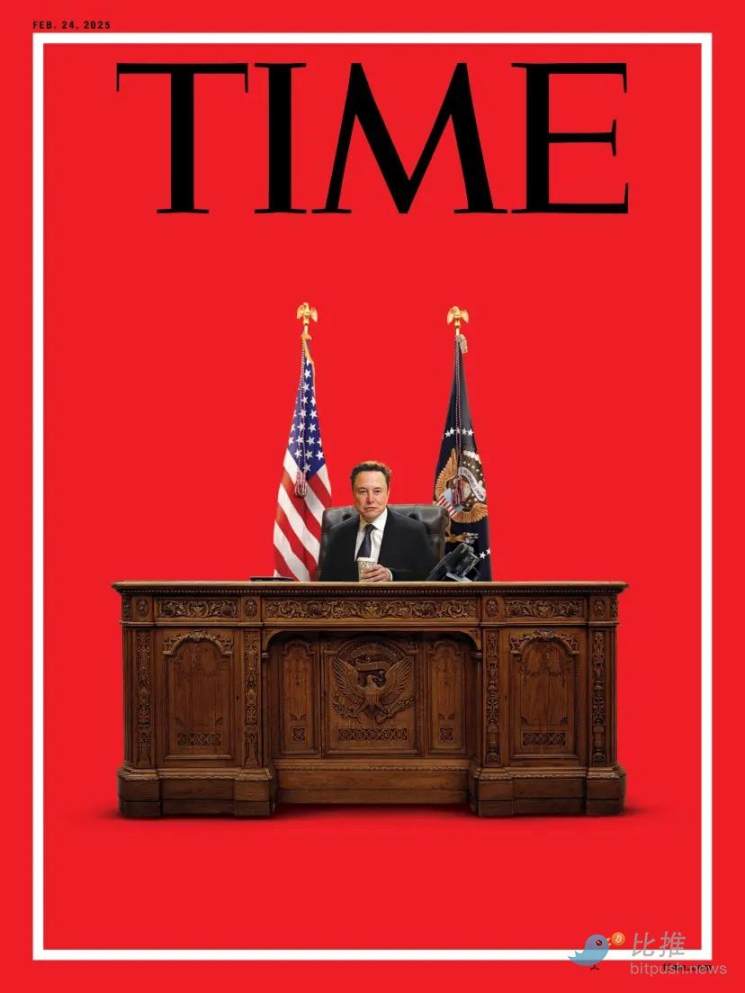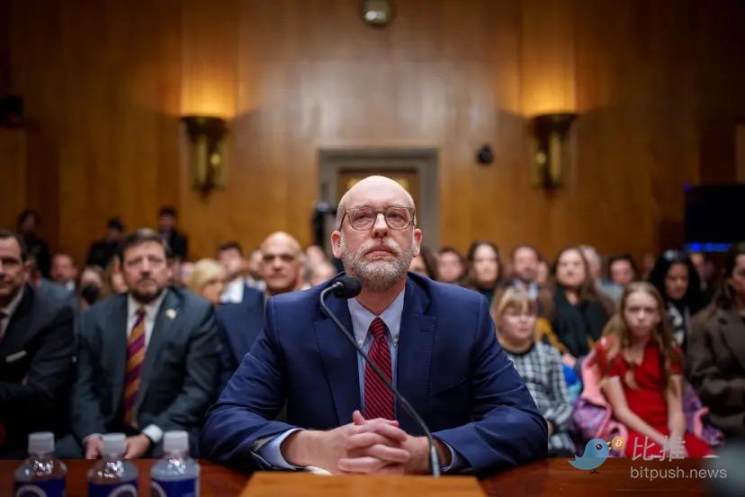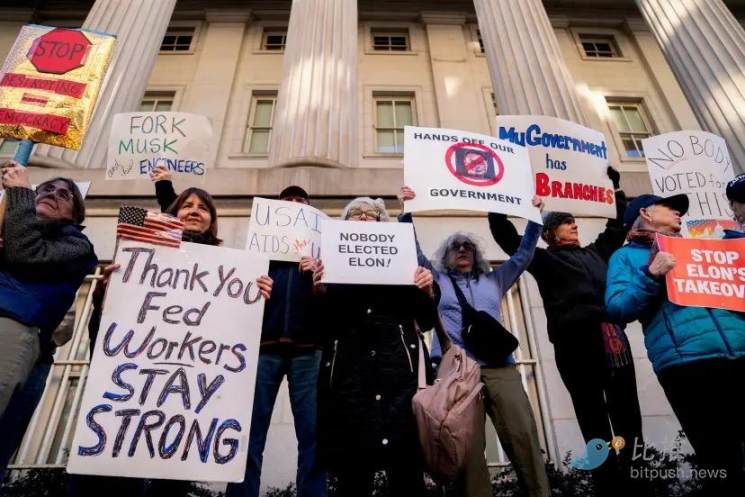Musk begins to "reorganize the U.S. government."
Source: TIME
Translation: BitpushNews Mary Liu
The standoff at 1300 Pennsylvania Avenue did not attract much attention. On February 1, a team under Elon Musk arrived at the U.S. Agency for International Development (USAID), just a few blocks from the White House, demanding full access to its headquarters. USAID staff refused their request. There were no guns drawn, no physical confrontations, and the police did not intervene. But in these early days of the Trump administration, perhaps no other scene could more clearly reveal the forces reshaping the U.S. government.

On one side is an agency with a 64-year history, a $35 billion budget, and a mission enshrined in federal law. On the other side is Musk's political "disruption squad"—they call themselves members of the "Department of Government Efficiency" (DOGE). DOGE is a temporary team without a charter, a website, or clear legal authority. Its power derives from Musk, the world's richest man, who has been authorized to reorganize the vast bureaucratic structure of the federal government—cutting budgets, laying off civil servants, and stripping independent agencies of their ability to obstruct presidential goals.
The leadership at USAID tacitly allowed Musk's team—a group of young and passionate followers—to enter its headquarters for several days at the end of January. Some USAID officials privately referred to them as the "DOGE kids." These young people, armed with clipboards, patrolled the hallways, inspected desks, and questioned managers. However, as the weekend approached, their demands—including access to sensitive facilities used for storing classified information—exceeded the tolerance of USAID's security chief. Members of DOGE threatened to call in U.S. Marshals to clear the building. They also reported the issue to Musk, who subsequently posted on his social media platform X to his 215 million followers, stating, "USAID is a criminal organization, and it's time to make it disappear."
The reasons behind Musk's "crusade" remain unclear. Nevertheless, by the next morning, the agency, which allocates billions of dollars annually worldwide to combat hunger, disease, and provide clean water to millions, was nearly paralyzed. Within a week, almost all employees were placed on forced leave, and its global offices were closed.
Other government agencies received a clear message. No ordinary citizen, especially those whose wealth and business networks are directly overseen by federal authorities, should have such power over U.S. government agencies.
So far, Musk seems to be accountable only to President Trump, who granted his campaign donor a broad mandate to align the government with his agenda. DOGE forwarded all inquiries from TIME magazine regarding its work to the White House, but the White House declined to comment.
Musk's team has already taken control of the U.S. Digital Service and established a foothold within the Office of Personnel Management (OPM)—the federal human resources department. The Department of Education is on edge, fearing an impending "self-castration" directive. Few agencies seem safe. Musk has made it clear that he will not tolerate dissent, no matter how legitimate. Just days before the "dramatic events" at USAID, a Treasury official refused to allow Musk's team access to the U.S. federal payment system. That official was forced to retire, and newly appointed Treasury Secretary Scott Bessenet complied with Musk's team's requests. After a lawsuit was filed by a group of current and former employees, the government agreed on February 5 to restrict that access, at least temporarily.
These are just the initial ripples in a massive anti-government wave. Budgets will be cut, valuable programs will be canceled, and civil servants pursuing careers will be fired, replaced by political appointees whose primary qualification is loyalty to the president, which is the path chosen by voters. For many, the idea that one of the world's most accomplished entrepreneurs, with the speed and determination he displayed in founding car and rocket companies, is attacking a vast and rigid federal bureaucracy is seen as something to celebrate rather than worry about. "The federal government is so large, there are certainly significant opportunities for savings and efficiency improvements," said Robert Doar, president of the right-leaning American Enterprise Institute. "The president and his team are paying a lot of attention to this, which is a good thing."
However, strong public opposition may be brewing, and critically, it goes far beyond the scale of the federal balance sheet, the number of employees in various agencies in Washington, D.C., or the dangers posed by an unelected individual wielding such unchecked power. Americans will soon discover that the way they interact with the federal government is something they have taken for granted or were unaware of.
Companies exporting technology products to China may no longer have State Department or Commerce Department employees to explain how to avoid violating criminal laws for free. Farmers in the American Midwest may soon find that USAID-funded buyers are no longer paying for flour sent to refugee camps. Millions around the world who rely on the U.S. for food, medicine, and shelter may suddenly have to fend for themselves.
Currently, millions of government workers find themselves at Musk's mercy. A Department of Homeland Security employee described how her team adopted a "defensive posture" while waiting for Musk's team to visit. To understand their fate, she added that her colleagues turned to a book titled "Character Limit," which chronicles how Musk took over Twitter two years ago and laid off 80% of the staff, causing chaos and lasting consequences.
His reorganization of the bureaucracy bears striking similarities to the above situation. On January 28, millions of government employees received an email offering them eight months' salary in exchange for their resignation. Musk had proposed a similar deal to Twitter employees two years ago, even using the same subject line: "Crossroads."

The director of the Office of Management and Budget, Russell Vought, nominated by Trump, attended the confirmation hearing on January 15. Andrew Harnik—Getty Images
Everything is traceable. Among Musk's friends in Silicon Valley, many understand that his acquisition of Twitter was a preparation for a greater cause. "The current atmosphere is that we hope Musk can do the same thing to the U.S. government," a knowledgeable source told TIME in November. Senior officials from Trump's first administration had also long formulated their plans before the election, publishing a lengthy 900-page report titled "Project 2025." One of the main authors of the project, Russell Vought, said in a speech two years ago that he hoped the civil servants envisioned in his proposed purge would be "traumatically affected," adding, "We want their funding to be cut off. We want to traumatize them."
During the campaign, Trump vowed he had nothing to do with the plan, stating, "It is inappropriate for them to produce such a document," he told TIME in November. "There are some things I strongly oppose." But once in office, he chose Vought to head the White House Office of Management and Budget, which is now closely collaborating with Musk to implement key parts of Project 2025. So far, according to TIME's analysis, the frenzied early actions of President Trump have nearly reached two-thirds of what is prescribed.
Musk has never hidden his intentions. Two weeks after the election, he co-wrote an article in The Wall Street Journal, promising that his team would help Trump "hire a lean team of small government crusaders" who would work to "massively reduce the number of federal bureaucrats." Recruitment efforts began shortly after the election, drawing from Musk's followers in Silicon Valley, some of whom had just graduated from college and were ready to be dispersed throughout Washington.
Musk appointed Steve Davis, an aerospace engineer who previously led Musk's cost-cutting efforts at Twitter, as the head of DOGE's personnel. In late December, as the presidential transition unfolded within the White House, Davis attended a series of meetings with members of the Biden administration. Democratic staffers noted his keen interest in a little-known branch of the White House, the U.S. Digital Service (USDS). Davis wanted to know how it operated, who it reported to, and what access it had.
The U.S. Digital Service was established in 2014 to work with federal agencies to improve computer systems and databases. It has a map of the government's technological infrastructure and has points of contact with technology officials in nearly every federal agency. This makes it the perfect place to host Musk's team. By controlling the USDS, Musk's team can access critical systems of the federal government, enabling massive layoffs and budget cuts, like "poison" flowing through "veins" to gradually weaken the entire government's operations.
The power of the U.S. Digital Service began on inauguration day. One of Trump's earliest executive orders renamed it the "U.S. Musk Service," cleverly retaining the office's acronym. The order also ensured that the new entity would report directly to the White House Chief of Staff. Since then, the office has established offices at the State Department and the Treasury Department. It began accessing personnel computer systems, firing contractors, and blocking payments to them.
Musk also sent a team to the Office of Personnel Management. This office holds records for 2.1 million workers, nearly every federal employee's email address, and tracks $59 billion in federal healthcare premiums and $88 billion in federal pension payments annually. According to a source familiar with these actions, the initiative to issue "mass acquisition offers" to government employees originated from Musk's team within the Office of Personnel Management. (Both Musk's team and the White House declined to comment.)
Next, Musk's team began cutting funding for the Office of Personnel Management itself. Brian Baird, who recently served as the Vice President of Human Resources at Musk's aerospace company, told the personnel management office's career director that the goal was to cut 70% of its staff, a move that would weaken its healthcare benefits and retirement plan teams, according to a current official at the Office of Personnel Management.
Some senior leaders at the Office of Personnel Management have been locked out of key databases, the official said, while political appointees can access systems, including corporate human resources integration, without the standard safeguards designed to protect such information's privacy. This system includes information such as pay grades, years of service, Social Security numbers, birth dates, and home addresses.
A few days after Trump took office, the White House ordered a freeze on federal spending—from foreign aid to public health programs and everything in between. The government stated that the freeze would only be lifted when agencies aligned with the president's agenda: cracking down on immigration, ending diversity efforts, and halting investments aimed at reducing the environmental impact of fossil fuels. Faced with lawsuits in court, the White House rescinded the order.

Protests outside the U.S. Treasury building in Washington, D.C. on February 4.
Musk's layoffs continued, with Trump continuing to give his blessing. "Musk cannot do—nor will he do—anything without our approval," Trump told reporters in the Oval Office on February 4. "We will give him approval at the appropriate time," he added. "Where it is inappropriate, we will not."
Some believed Trump might restrain Musk's actions to prevent him from being too radical, but civil servants were not waiting for that to happen. In Northern Virginia, where tens of thousands of federal employees and military personnel reside, a typical town hall meeting in Leesburg attracted dozens, while hundreds gathered on the night Musk shut down USAID. "We heard strange stories," said local Democratic Congressman Suhas Subramaniam, who spoke at the event. With a large number of workers flooding into his office describing Musk's team's takeover actions, he instructed his staff to document these testimonies and assist whistleblowers. Subramaniam insisted to TIME that much of what they witnessed was "simply illegal." "We are almost being put to the test and encouraged to sue or investigate."
Some lawsuits indeed proved effective. The White House complied with a court order that blocked its attempt to freeze trillions of dollars in federal spending. A judge delayed the deadline for the acquisition offers to government employees in a ruling on February 6. Unions representing federal workers filed lawsuits against Musk's team. Even Musk's usual admirers warned that he was overstepping. An editorial in The Wall Street Journal on February 4 noted, "Lawsuits are pouring in," and "if Mr. Musk is not careful, the courts will disrupt it before the projects even get off the ground."
On Capitol Hill, Musk's attack on the bureaucracy sparked a struggle between him and the Democrats, a struggle that could determine the future of the government and its internal power balance. On the afternoon of February 3, Maryland Democrat Jamie Raskin told a crowd outside USAID, "We do not have a fourth branch of government called Elon Musk." Meanwhile, Musk's team (DOGE) was inside USAID trying to forcibly implement their plans.
Jamie Raskin was right. But the agency staff listening to him on Pennsylvania Avenue were uncertain if they could keep their jobs, unable to gauge how much power Musk had gained and whether he would bend other government departments to his will. One staff member seemed particularly skeptical. Yes, she told TIME, the Constitution grants Congress the power of the purse. But Musk had already demonstrated his power to strip that authority away.
"The Democrats can only do so much," she said, unwilling to disclose her name to avoid drawing more attention from DOGE. Her official email account had been shut down, and she could no longer access her desk within the agency. Like thousands of colleagues and millions of Americans, she could only watch as Musk's actions unfolded step by step, wondering: how far would he go? And what—if anything—could stop him?
免责声明:本文章仅代表作者个人观点,不代表本平台的立场和观点。本文章仅供信息分享,不构成对任何人的任何投资建议。用户与作者之间的任何争议,与本平台无关。如网页中刊载的文章或图片涉及侵权,请提供相关的权利证明和身份证明发送邮件到support@aicoin.com,本平台相关工作人员将会进行核查。



